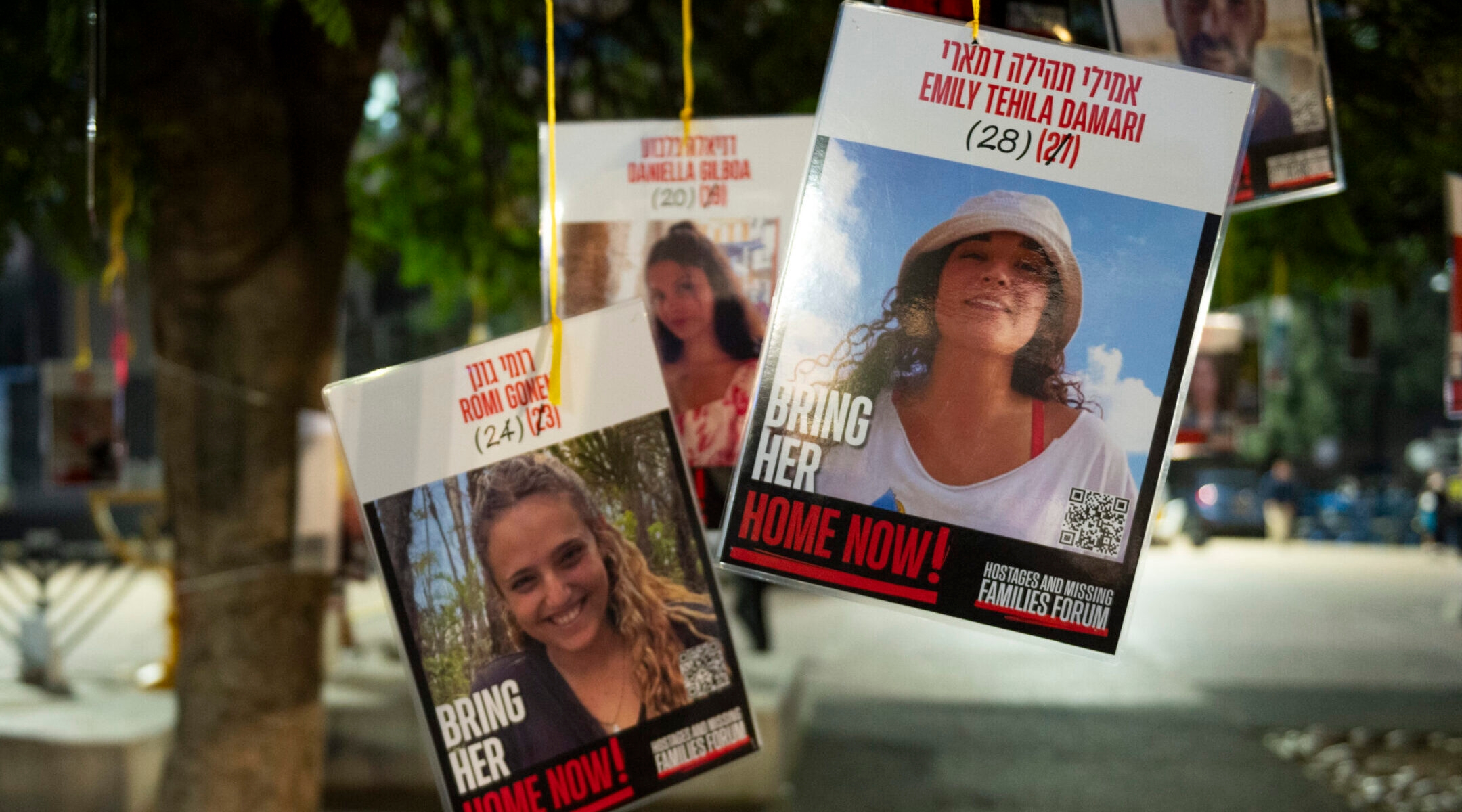Hostages Emily Damari, Romi Gonen, Doron Steinbrecher released as Israel-Hamas ceasefire sets in
Separately, Israel retrieved the remains of a soldier killed in the 2014 Gaza war

Posters of hostages Emily Damari and Romi Gonen, two of the first hostages Hamas said it would release from Gaza, are displayed at Tel Aviv’s Hostage Square, Jan. 16, 2025. (Noam Galai/Getty Images)
(JTA) — Three women whom Hamas held hostage in Gaza for more than 470 days are returning to Israel as a ceasefire in the Israel-Hamas war went into effect on Sunday morning.
The women were all alive and exited on their own from a Hamas vehicle, according to footage streamed from Gaza. Representatives of the Red Cross met them there in preparation for returning them to Israel, where their families and medical professionals are waiting.
The women, civilians abducted when Hamas terrorists invaded southern Israel, were the first hostages freed from among 33 set for release over six weeks, according to a ceasefire deal struck last week. They are:
- Emily Damari: The only British citizen to remain in Gaza, Damari, 27, was shot on Oct. 7 but seen alive in Gaza by other hostages who returned. She was abducted from Kibbutz Kfar Aza.
- Romi Gonen: Taken hostage from the Nova music festival, Gonen, 24, was shot on Oct. 7 but seen alive in Gaza by other hostages who returned.
- Doron Steinbrecher: Taken hostage from her home at Kibbutz Kfar Aza, Steinbrecher appeared alive in a video released by Hamas in January 2024.
No official announcement was been made about their condition before their release, but Romi Gonen’s father told an Israeli radio station that he understood that his daughter would be returning alive. Their mothers were called to Reim, near to the site of the Nova massacre, to be reunited with the women.
Israeli authorities have prepared to provide medical and psychological treatments to hostages as they return. There remain 98 hostages, of whom 33 will be released over six weeks during the first phase of a ceasefire deal, from more than 250 taken on Oct. 7.
Separately, Israel announced that it had retrieved the remains of Oron Shaul, a soldier who was killed in the 2014 Gaza war and held hostage since then. Shaul is one of 36 people abducted from Israel who are known to be dead; under the terms of the ceasefire, their bodies would be returned only after Israel fully withdraws from Gaza and reconstruction of the territory begins.
The ceasefire began slightly later than planned because of a delay in announcing the names of the hostages to be returned, which Hamas attributed to “technical difficulties” in communicating within the territory.
It also followed Israel’s Supreme Court rejecting petitions from Israelis who oppose the deal, mostly because of the large number of Palestinian security prisoners, including convicted murderers, who will be released under the agreement.
Israeli Prime Minister Benjamin Netanyahu faces intense pressure over whether to continue the war after the six-week pause. A crucial right-wing government partner has threatened to exit his coalition if fighting does not resume at that time. But Donald Trump, who is being sworn in Monday as U.S. president, has strongly pressed for a permanent end to the war.
In an extended statement on Saturday, Netanyahu said both Trump and Joe Biden, the outgoing president, had endorsed a resumption in fighting in the future.
Calling the current pause a “temporary ceasefire,” Netanyahu said, “Both President Trump and President Biden have given full backing to Israel’s right to return to the fighting, if Israel reaches the conclusion that the second stage negotiations are ineffectual. I greatly appreciate this.”














